Robert F Kennedy Jr. (RFK) claimed this week that children on the autism spectrum will “never play baseball”—a statement that immediately struck out with fans of the sport. On social media, users are pushing back with a combination of real-world examples and personal experience to prove just how wrong the Secretary of Health and Human Services is. From professional athletes like Tarik El-Abour and Rube Waddell, to MLB players with famously obsessive routines, baseball fans are making it clear: not only can autistic and neurodivergent kids play baseball, they might be particularly well-suited for it.
These fans largely suspect that RFK Jr. doesn’t know much about either autism or baseball. It might be the sport involving the most complicated math and the most players with special interests and strict routines.
What did RFK Jr. say about autistic kids and baseball?
On April 16, 2025, RFK Jr. held a news conference to speak on his plans to “eliminate” autism. He pushed the resoundingly debunked claim that some sort of “environmental exposure” (meaning vaccines) causes this neurodivergence and used frightening rhetoric that could only describe the most severe and rare cases.
“Autism destroys families; and, more importantly, it destroys our greatest resource, which is our children,” he claimed. “These are children who should not be suffering like this.”
“And these are kids who will never pay taxes. They’ll never hold a job. They’ll never play baseball. They’ll never write a poem. They’ll never go out on a date. Many of them will never use a toilet unassisted, and we have to recognize we are doing this to our children.”
This put the autistic community on immediate alert because it turns out they don’t want to be eliminated. Many on the spectrum embrace the way their brains work and reject the idea that their neurodivergence is a disease that needs to be cured. They are just different from the majority, and their problems are a result of society refusing to accommodate differences, not an inherent shortcoming.
The autistic baseball fandom feels particularly put off, because not only can they play the sport, but they may be better suited to it than the rest.
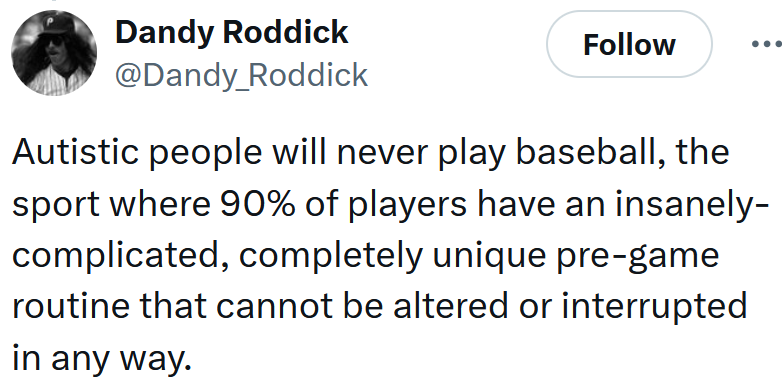
“Autistic people will never play baseball, the sport where 90% of players have an insanely-complicated, completely unique pre-game routine that cannot be altered or interrupted in any way,” wrote @Dandy_Roddick.
‘Have you ever heard a major league pitcher talk?’
While there are examples of high-level baseball players who have been diagnosed with autism, whether RFK Jr. has heard their names or not, baseball fans on X appear to think that several others have flown under the radar while showing clear signs.
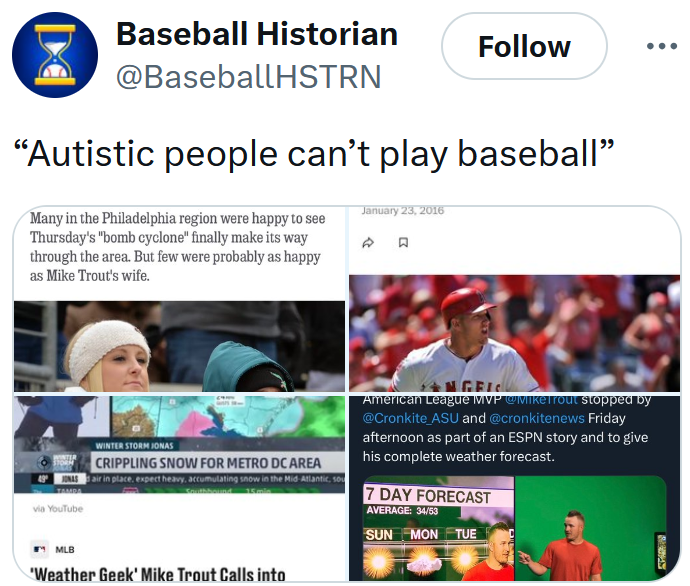
For example, Mike Trout of the Los Angeles Angels is a certified “weather geek” who keeps showing up at his local weather station to help with the forecast. Meanwhile, in July 2024, Luis Castillo of the Seattle Mariners started meticulously planting rows of sunflower seeds in the dugout. There is no neurotypical explanation for this.
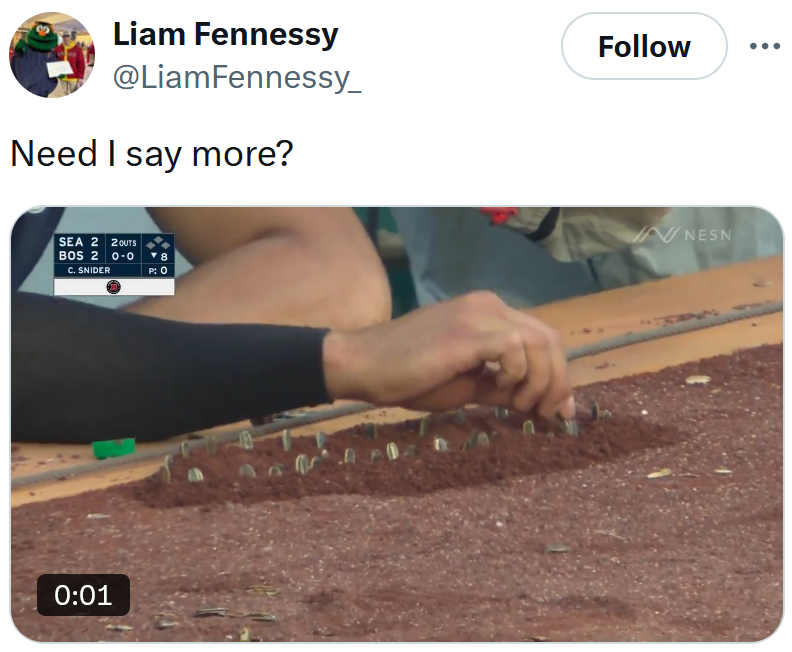
In particular, X users point to the unusual behaviors of pitchers like Zack Greinke and Rube Waddell. The latter used to get distracted from his incredible performance by his favorite things.
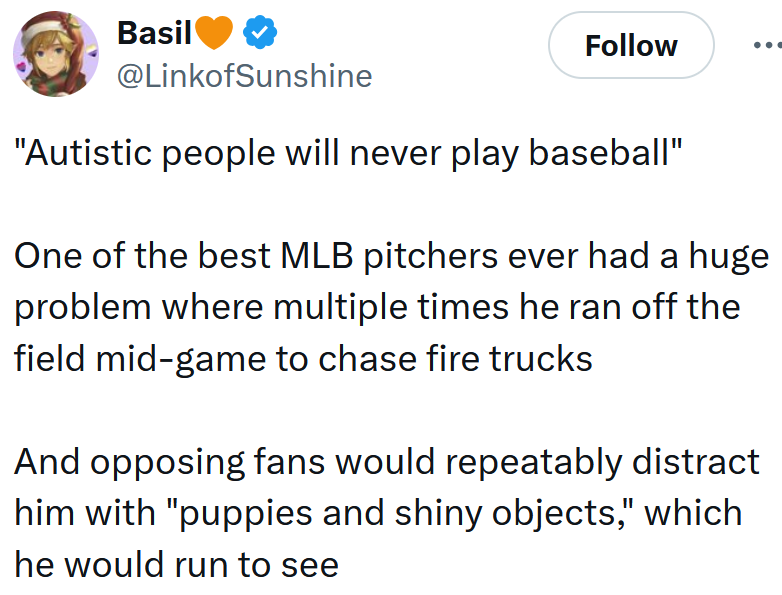
“One of the best MLB pitchers ever had a huge problem where multiple times he ran off the field mid-game to chase fire trucks,” said @LinkofSunshine. “And opposing fans would repeatedly distract him with ‘puppies and shiny objects,’ which he would run to see.”
Waddell peaked in the early 1900s, years before Swiss psychiatrist Paul Bleuler coined the term “autism.” But a hyper-focus on one’s favorite objects and topics is a classic sign, and one that seems to be common among pitchers.
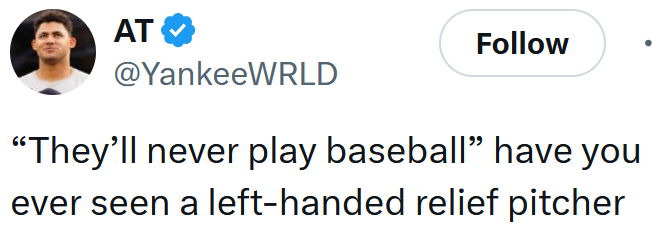
“‘They’ll never play baseball’ have you ever seen a left-handed relief pitcher,” wrote @YankeeWRLD.
User @WNBAPILLED further asked if RFK Jr. had “ever heard a major league pitcher talk.”
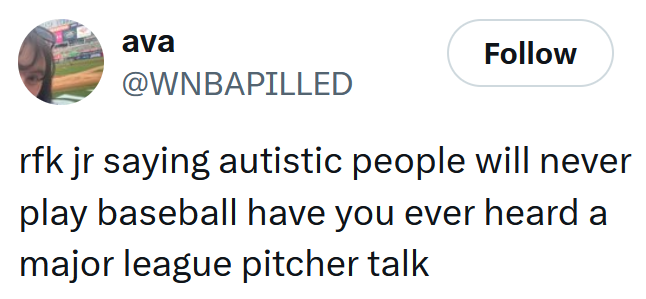
“I know of what I speak: MLB players are the most autistic group in pro team sports,” said @BWDBWDBWD, concluding that RFK Jr. “does NOT know ball.”
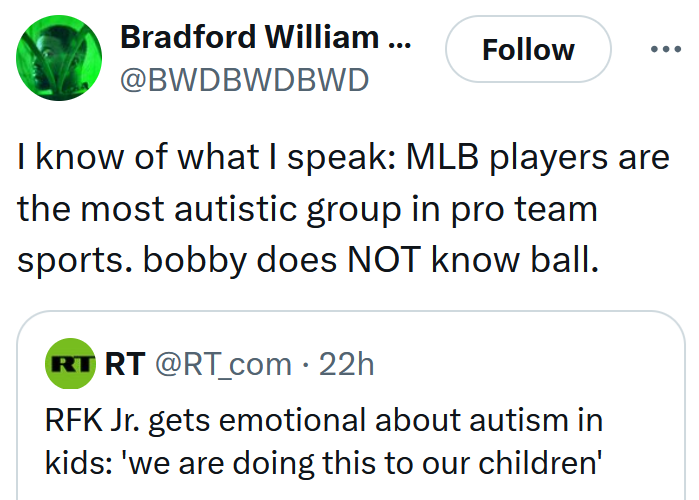
Tarik El-Abour would like a word
Aside from the armchair diagnosing, there are multiple confirmed autistic baseball players today. The most well-known is Tarik El-Abour, who became the first diagnosed autistic MLB player in 2018. He was diagnosed at age three, started playing ball at 10, and won back-to-back Rookie of the Year awards in 2016 and 2018 before signing with the Kansas City Royals.
According to El-Abour’s mother, his autistic hyper-focus drove the dedication necessary to reach these heights. Instead of going out on the town like his teammates, he practiced.
“Being autistic, this was completely normal to Tarik,” she said. “His briefcase was his baseball bag. He found friends to play catch, he even paid a few pitchers to throw batting practice, he run sprints around the ballpark, engage in Plyometric exercises and ate healthy to do his best.”
College ball’s Ryland Zaborowski has a similar story. Diagnosed at age three, he became one of Miami University’s best in 2023. He might have laughed in RFK Jr.’s face if he’d told autism makes it impossible to play baseball.
“Around the age of 7 or 8 is the earliest I can remember that I just fell in love with the game,” he told The Miami Student. “You couldn’t take me away from it.”
The internet is chaotic—but we’ll break it down for you in one daily email. Sign up for the Daily Dot’s web_crawlr newsletter here to get the best (and worst) of the internet straight into your inbox.


